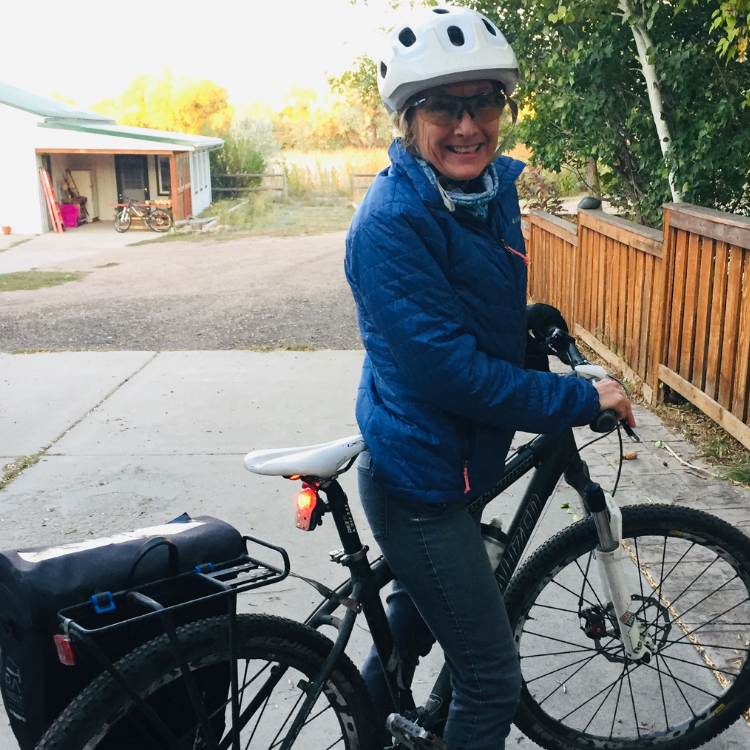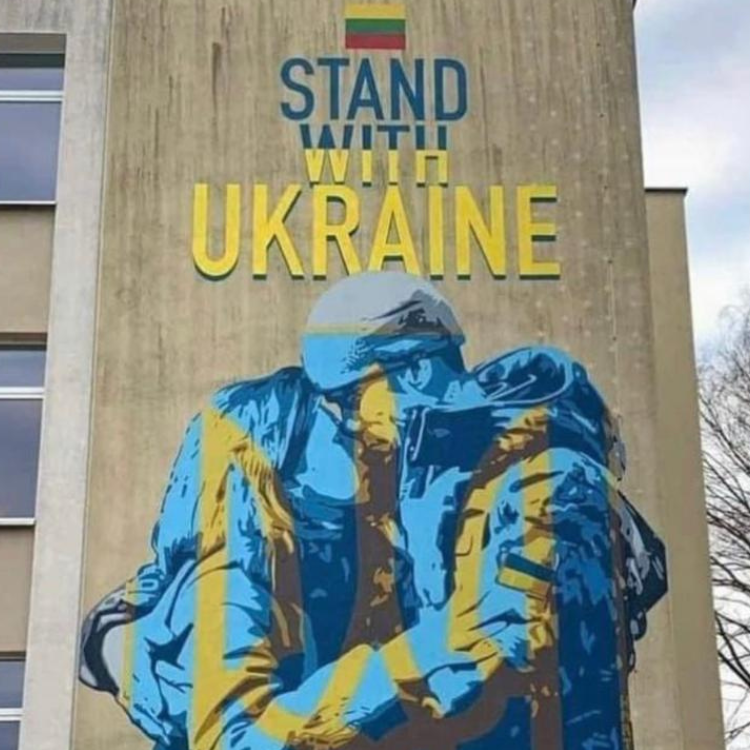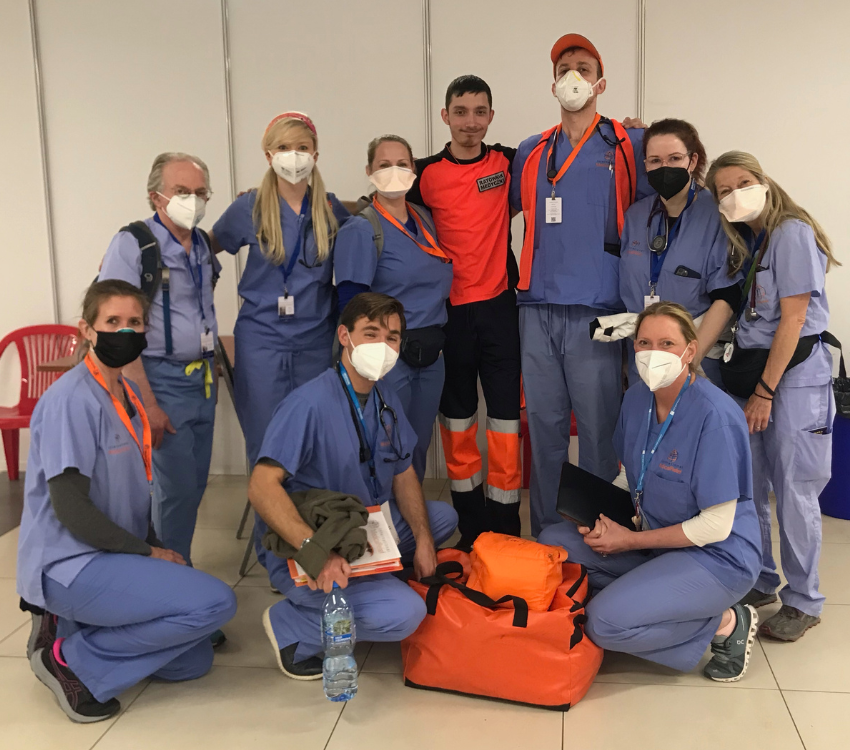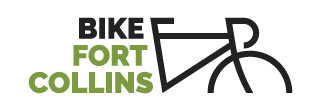Bike Fort Collins first launched You Know Me. I Ride a Bike. Back in 2009 as a broader awareness campagin featuring local residents active in our bike loving community. Beginning in 2021, we are excited to reintroduce this bio-series, recognizing one new Fort Collins resident each month here on our news-blog/website, The Pedal Post eNewsletter and BFC social channels, and highlighting their love for bikes. Please join us as we hear their stories and learn more about these remarkable folks who live and ride right here in our community.
June 2022: Stesha Irons
….by Jennifer Hoover, BFC Board Member
 Stesha Irons leads employee yoga each Thursday, shoving heavy furniture around in the lobby of the clinic where she provides OB/gyn care as a certified nurse midwife (CNM). Stesha stopped delivering babies in 2010, trading in sleepless nights and unpredictability for seeing patients in the office, often 20 per day. Which is hardly an easy schedule. To say she is energetic is an understatement. Still, she is the kind of person who trades in their lunch hour to increase the health and well-being of her fellow employees. A person who takes the time to impart a quiet meditation before the crush of patients resumes at 1pm.
Stesha Irons leads employee yoga each Thursday, shoving heavy furniture around in the lobby of the clinic where she provides OB/gyn care as a certified nurse midwife (CNM). Stesha stopped delivering babies in 2010, trading in sleepless nights and unpredictability for seeing patients in the office, often 20 per day. Which is hardly an easy schedule. To say she is energetic is an understatement. Still, she is the kind of person who trades in their lunch hour to increase the health and well-being of her fellow employees. A person who takes the time to impart a quiet meditation before the crush of patients resumes at 1pm.
Stesha does things because they need to be done, because she feels a sense of responsibility to her fellow humans and because she wants to put something good out into the world. It is for this reason that she decided to embark on a medical aid trip to Poland. Because, in her words, she needed to do something instead of feeling helpless, and because she had the time, ability and skill to devote to a place she had never been and people she had never met.
It was this “goodness” that had Stesha on our radar for “You Know me, I Ride a Bike.” She isn’t famous, hasn’t committed herself to any epic biking endeavors or competed in any races. If anything, Stesha is a typical Fort Collins story—married to a devoted mountain biker she recounts trips to Moab with the kids, and supporting her son who used to race with Cyclismo and grew up to be a custom BMX frame builder. It is all so perfectly FoCo.
I noticed several years ago that Stesha reliably put on her bike helmet and hoisted her panniers over her forearm before leaving for the day. I would often pass her on the street as I made my way south and she headed north. In my mind Stesha became my kindred spirit of bike commuting, an ally in a secret war against jockeying for space in the crowded garage or more recently, the staggering gas prices. During our discussion, I learned that Stesha only became a regular bike commuter at the beginning of the pandemic when a need for caring for her mental health led her to ride daily. Stesha tells me that her daily 12-mile rides lifted her spirits, helping her both prepare for the day ahead and unwind before walking in the door at night. She talks about how she noticed her neighbors more, waving to the regular morning joggers and dog walkers. It enhanced her feeling of community. “Riding a bike makes me happy.” So, humbly Stesha did the only two things that are necessary to be featured in “You Know Me,” that is, to ride a bike, and do something interesting! Her account of her journey was so compelling that we wanted to give her a forum to share this experience with our community.
In April Stesha prepared to travel to Poland to take part in medical relief for Ukrainian refugees displaced by war and stranded at the border. She collected reading glasses for adults and stickers for the children as these were two small things, she could carry with her to easily be dispensed as needed once on site. Her exact travel plans were confidential for safety, and she was nervous ahead of her journey, but Stesha wasn’t new to humanitarian relief work and drew on her previous experiences working in Haiti as she prepared. She kept in touch with family and friends via What’s App, sending pictures and updates when able. The following is Stesha’s account of her time in Poland in her own words, edited for clarity.
“The facility I staffed was intended to serve as a short-term stopping point, where people would stay for three days max, however, almost everyone stays longer. Those with families in other countries or resources have utilized those connections, leaving the lower income families of laborers and farmers and people from smaller rural cities seeking safety. They arrive at a huge convention type space, flags of all countries accepting those who are displaced hang in the entry. The cots spread out like a sea. Some rooms are reserved specifically for families, and evidence from the home they left sits nearby, a framed picture or a vase the only remaining semblance of the home they left. A makeshift daycare and a school room of sorts provide spaces for mothers to maintain a sense of structure. Laundry hangs from doorknobs and cot frames and banks of donated washers line the wall. Showers are housed in shipping containers brought in, there are not enough for the population. The huge dark exhibition halls filled with cots and families offer no privacy. Lights are dim in some areas and never turn off in others, sleeping bodies lay under blankets at all hours. The smell of so many bodies and animals stick in your nose, leaving an unfamiliar smell. Those with pets have a sense of purpose, they love the comfort and attention they bring, donations of pet food are housed in a corner. A makeshift clothes area provides clean new clothing.
 The stories we hear are of buses packed with people passing them by as they struggle with what they can carry and travel at night for safety. In everyone’s eyes you see exhaustion and loss. A few who arrive get jobs within the center helping others with getting documents or finding work or housing. The majority do not want to go anywhere else other than home, back to the life they had been forced to leave. Efforts are made to show people care, Polish citizens organized live music, or a day in the parking lot with a street fair with face painting and a bouncy house (much to our horror after treating diarrhea all week). Basketball courts and foosball tables keep teen boys busy; they love to shout “United Ukraine” when we pass. One heartbreaking evening a young girl sat at the piano and played so beautifully as her mother sat beside her with tears in her eyes. I am transported to her prior life. Generations of women are alone, navigate alone, they form friendships and look out for each other. They wave us over to be inform of a friend nearby having a cough or complaints of back pain.
The stories we hear are of buses packed with people passing them by as they struggle with what they can carry and travel at night for safety. In everyone’s eyes you see exhaustion and loss. A few who arrive get jobs within the center helping others with getting documents or finding work or housing. The majority do not want to go anywhere else other than home, back to the life they had been forced to leave. Efforts are made to show people care, Polish citizens organized live music, or a day in the parking lot with a street fair with face painting and a bouncy house (much to our horror after treating diarrhea all week). Basketball courts and foosball tables keep teen boys busy; they love to shout “United Ukraine” when we pass. One heartbreaking evening a young girl sat at the piano and played so beautifully as her mother sat beside her with tears in her eyes. I am transported to her prior life. Generations of women are alone, navigate alone, they form friendships and look out for each other. They wave us over to be inform of a friend nearby having a cough or complaints of back pain.
The politics of humanitarian relief is complicated. Rules change every day, there is no clear advocacy for the displaced, and random groups and volunteers will appear to help without proper vetting. We had to be very secretive about our locations and when various news crews would approach, we would deflect them as instructed. The Canadian military had a strong medical team. Also, an amazing group of Italians appeared and provided housing and transportation for a large family and their pets. We had another group from an unknown place who purchased 4 ambulances and came for supplies and wound care and were planning to cross into Ukraine and serve the soldiers. We gave them loads of supplies but never knew what happened next. A warehouse full of donations sits in the back of the facility, some useful like diapers, feminine hygiene, shampoo, and non-perishable food. Some less like a case of tooth whitening strips. The pharmacy is haphazardly organized, medicine in many languages, never the right combination or number of doses, never enough of what we really needed like cough syrup and inhalers.
The interpreters were such a joy, many were college students either from Ukraine and studying in Poland or had fled with family and were students in Ukraine. A 19-year-old boy named Vlad was often with me. He left Ukraine where he was attending college the day before the war began. One day later and he would have been drafted into the military. His family had relocated 3 years before to Poland, but they are Ukrainian citizens. Another favorite was a NYU professor of history, he was on sabbatical in Poland since September and after the war started, he offered his knowledge of Russian to assist. Many Ukrainians speak Russian, very few speak English. The Ukrainian people have a startling manner of speaking to you, almost a shout, it takes getting used to.
 The practice of medicine was very chaotic, and again, the rules changed daily. The Ukrainian people are not used to being assessed. They go to a pharmacy in their country and get treated and some would tire of having a history taken and just wanted antibiotics. Others seemed to find comfort in hearing parameters that were normal only to return the next day with a new complaint. How can you get ahead of illness born of chronic stress and overcrowding? When we walk through the halls, coughs vibrate through the air. Children pass around vomiting and diarrhea, Covid is not tested for, as no action or isolation can be provided. The vaccine rate in this area of Europe is very low. Thus, the infection of some team members was inevitable despite PPE.
The practice of medicine was very chaotic, and again, the rules changed daily. The Ukrainian people are not used to being assessed. They go to a pharmacy in their country and get treated and some would tire of having a history taken and just wanted antibiotics. Others seemed to find comfort in hearing parameters that were normal only to return the next day with a new complaint. How can you get ahead of illness born of chronic stress and overcrowding? When we walk through the halls, coughs vibrate through the air. Children pass around vomiting and diarrhea, Covid is not tested for, as no action or isolation can be provided. The vaccine rate in this area of Europe is very low. Thus, the infection of some team members was inevitable despite PPE.
Many who came to the clinic were just trying to pick up where their life was disrupted, in the middle of cancer treatment or post operative dressing changes or seeking the continuation of cardiac medicines. Some Ukrainian soldiers came through, they were always seen by the doctors, (unless it was easy). We had an EKG that looked like something from Frankenstein, it used suction cups instead of leads. Most days you felt like you were putting a bandage on a garden hose not knowing how long it would hold or if it would get them to the next place. Fungal infections from wet dirty clothes worn for days were common as was dehydration.
My memories seem to resurface slowly, as it seems too much was coming at me to process. These are the things I remember today, and I hope to remember more tomorrow.”
On a recent bike trip, I was talking about this month’s post and my friend lit up, “Stesha delivered my baby!” You never forget the hands that deliver your child safely into the world. Stesha talks poignantly about working with mothers in particular while in the Ukraine—seeing the fear and devastation in their faces as they struggled to protect their children. “There were mothers alone with newborn babies, teenagers without parents and raw anguish of families torn apart without plans for reunification.” As a mother myself it was a part of the story that touched me the most. If this column has a central theme, it is the interconnectedness of our community and perhaps the world at large. Often these ties are numerous. We see our reflections in the fellow bike commuter who meets us at the bike rack in the morning and peddles away from us at night, or a mother struggling to keep her children warm and safe against extraordinary odds.
We want to thank Stesha for her work, her openness and sharing about her journey. And, of course for riding her bike, being one less car on the road and sharing the vision of Bike Fort Collins!
Did you enjoy this edition of YKM? Read about other inspirational local folks here.
